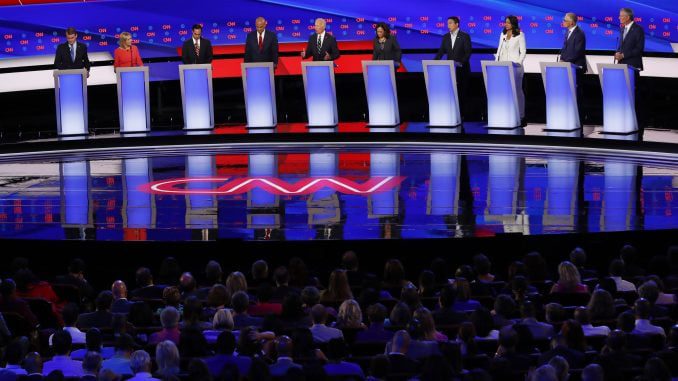
HAMPTON, S.C. — With 435 days until the next presidential election, the Democrats seeking to oust Trump are bracing for the nastiest contest in the modern era, one that will almost certainly tear at the moral and cultural fabric of a deeply divided nation.
Knowing what lies ahead once their own divisive primary is decided, Democrats are confronting a critical question: Just how low should they go to push back against Trump?
Political strategists and recent history suggest there may be more risk than reward for candidates wishing to fight Trump on his terms. But Democratic primary voters, energized and enraged by Trump’s turbulent presidency, are increasingly calling for the candidates to fight fire with fire.
“The high road isn’t going to win this time,” Blake Caldwell, a 71-year-old retired physician, said at a recent event hosted by candidate Pete Buttigieg in rural South Carolina. “If we go high when they go low, we will lose.”
Several White House hopefuls opened their campaigns with a firm plan to focus on substance and rise above the Republican president’s personal attacks. But as primary voting approaches, many candidates are embracing a more aggressive posture as they work to convince primary voters they have what it takes to stand up to Trump.
Most of the leading candidates have called for Trump’s impeachment. Virtually all of them have openly called him a racist.
Joe Biden is the notable exception on both. The former vice president and early Democratic front-runner has sidestepped both questions as he works to maintain an optimistic outlook while highlighting the gravity of Trump’s leadership.
Others, like Warren and Kamala Harris, generally lean into charged language against Trump only when asked. Bernie Sanders, however, seizes on Trump’s behavior in his standard stump speech.
“The United States cannot continue to have a president who is a racist, who is a sexist, who is a homophobe, who is a religious bigot, who is a xenophobe, and who is also a pathological liar,” Sanders declared at a recent town hall meeting in northern New Hampshire.
Sanders’ chief strategist, Jeff Weaver, said the senator would not shy away from aggressive criticism of Trump when necessary. Especially on issues of race and immigration, he said, calling Trump a racist shouldn’t be something candidates are afraid of.
“You can’t give into the bully. You gotta lean in and tell it like it is,” Weaver said. “That’s what people appreciate about Bernie.”
Jef Pollock, a pollster for New York Sen. Kirsten Gillibrand’s campaign, concedes that “there’s a lot of nervousness about how you attack Donald Trump.”
While primary voters may want toughness, persuadable general election voters are more likely to say they want bipartisanship and civility. Yet it’s not so simple, Pollock said.
“I think it would be a mistake for a candidate to think they could just go high. We’re not in the age of Barack Obama anymore,” he said. “It’d be a mistake to think you can just rise above it all and not engage him at his level.”
Republican pollster Frank Luntz has studied the art of negative campaigning extensively over the last 18 months. He insists there’s far more risk than reward for candidates who go negative — especially against Trump.
It’s all about context and subtlety.
“Do they appear pained as they deliver the body blow? Do they look and feel like they don’t want to be there, like they’ve been forced into it? It’s one of the most subtle arts at a time when politics feel so much like championship wrestling,” Luntz said. “Most candidates don’t know the difference.”
But back in South Carolina, Caldwell says she isn’t interested in a cautious candidate. She wants the ultimate Democratic nominee to be someone who can confront Trump with force.
“We’ve been too meek,” she said. “This is going to be the most vicious campaign in history.”



